Moderate overlap front: original test
Rating applies to 1999-2001 models
Tested vehicle: 1999 Saab 9-5 SE 4-door
The Saab 9-5 was introduced in the 1999 model year.
| Evaluation criteria | Rating |
|---|---|
| Overall evaluation | |
| Structure and safety cage | |
| Driver injury measures | |
| Head/neck | |
| Chest | |
| Leg/foot, left | |
| Leg/foot, right | |
| Driver restraints and dummy kinematics | |
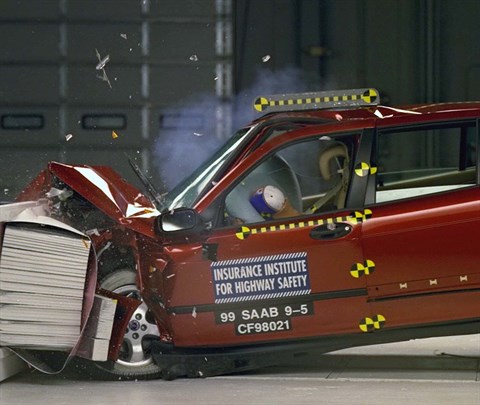
Action shot taken during the frontal offset crash test.
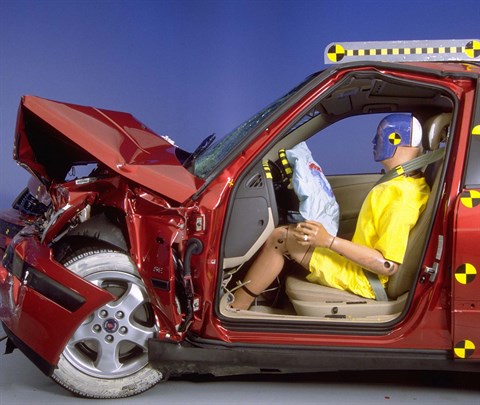
The dummy's position in relation to the steering wheel and instrument panel after the crash test indicates that the driver's survival space was maintained reasonably well.
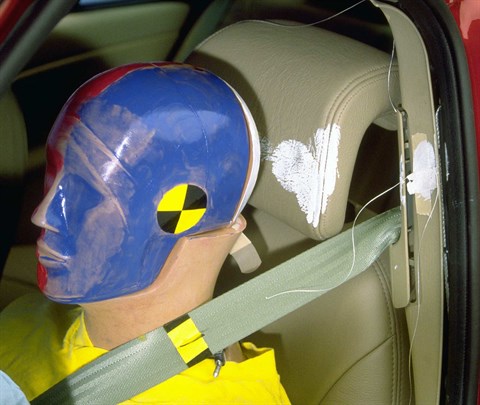
Smeared greasepaint shows where the dummy's head contacted the B-pillar and head restraint during rebound. Head accelerations from these hits were low.
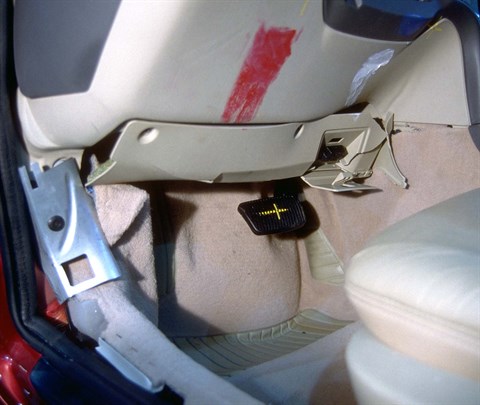
Intrusion into the driver footwell area contributed to high injury measures on the dummy's lower right leg, indicating the likelihood of injury.
Measures of occupant compartment intrusion on driver side
| Evaluation criteria | Measurement |
|---|---|
| Test ID | CF98021 |
| Footwell intrusion | |
| Footrest (cm) | 14 |
| Left (cm) | 18 |
| Center (cm) | 19 |
| Right (cm) | 16 |
| Brake pedal (cm) | 5 |
| Instrument panel rearward movement | |
| Left (cm) | 5 |
| Right (cm) | 2 |
| Steering column movement | |
| Upward (cm) | 3 |
| Rearward (cm) | 1 |
| A-pillar rearward movement (cm) | 7 |
Driver injury measures
| Evaluation criteria | Measurement |
|---|---|
| Test ID | CF98021 |
| Head | |
| HIC-15 | 289 |
| Peak gs at hard contact | 28 |
| Neck | |
| Tension (kN) | 1.2 |
| Extension bending moment (Nm) | 20 |
| Maximum Nij | 0.26 |
| Chest maximum compression (mm) | 31 |
| Legs | |
| Femur force - left (kN) | 3.7 |
| Femur force - right (kN) | 6.1 |
| Knee displacement - left (mm) | 3 |
| Knee displacement - right (mm) | 3 |
| Maximum tibia index - left | 0.38 |
| Maximum tibia index - right | 1.25 |
| Tibia axial force - left (kN) | 1.5 |
| Tibia axial force - right (kN) | 5.9 |
| Foot acceleration (g) | |
| Left | 69 |
| Right | 178 |
Side: original test
Rating applies to 1999-2009 models
Tested vehicle: 2004 Saab 9-5 Arc 4-door with standard front seat-mounted combination head and torso airbags
The Saab 9-5 was introduced in the 1999 model year. Although engineering changes were made to improve frontal crashworthiness beginning with 2002 models built after November 2001, these changes were not expected to affect side-impact performance.
The 9-5 was modestly restyled for the 2006 model year.
| Evaluation criteria | Rating |
|---|---|
| Overall evaluation | |
| Structure and safety cage | |
| Driver injury measures | |
| Head/neck | |
| Torso | |
| Pelvis/leg | |
| Driver head protection | |
| Rear passenger injury measures | |
| Head/neck | |
| Torso | |
| Pelvis/leg | |
| Rear passenger head protection The dummy's head was hit by the pillar behind the rear passenger door and the window glass and window sill of the rear door. The pillar is required by federal standard to provide some protection for occupants' heads. The impacts with the window glass and sill did not produce high head injury measures, but the head protection is inadequate. |
|
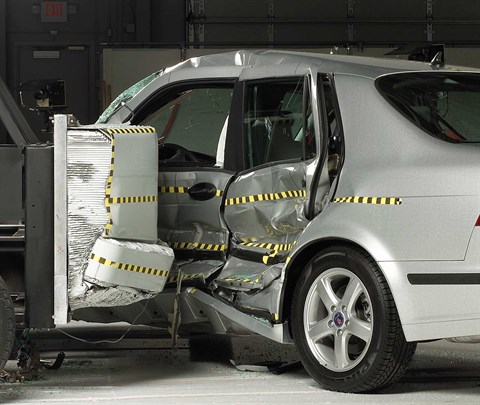
View of the vehicle and barrier just after the crash test.
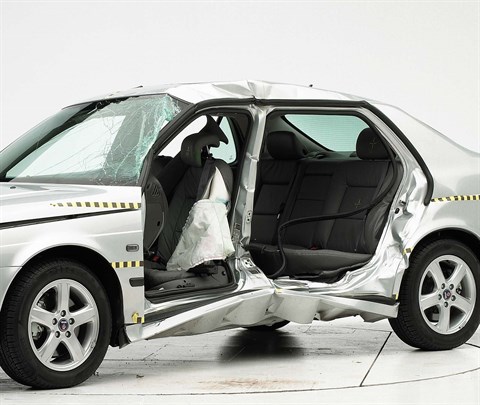
View of the vehicle after the crash with doors removed, showing the side airbag and damage to the occupant compartment.
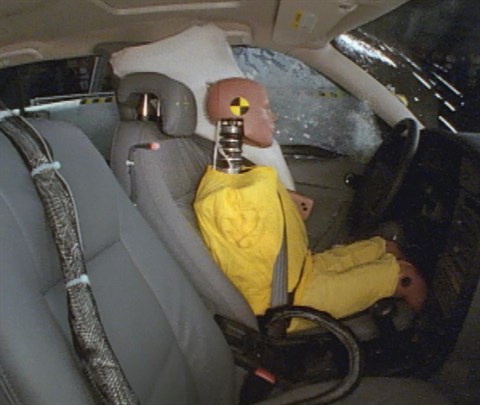
Action shot taken during the side impact crash test showing the driver dummy's head was protected from being hit by hard structures by the side airbag.

Smeared greasepaint shows where the rear passenger dummy's head was hit by the pillar behind the rear passenger door and the window glass and window sill of the rear door.
Measures of occupant compartment intrusion on driver side
| Test ID | CES0409 |
|---|---|
| B-pillar to longitudinal centerline of driver's seat (cm) | -2.5 |
| Negative numbers indicate the amount by which the crush stopped short of the seat centerline. | |
Driver injury measures
| Evaluation criteria | Measurement |
|---|---|
| Test ID | CES0409 |
| Head HIC-15 | 186 |
| Neck | |
| Tension (kN) | 1.1 |
| Compression (kN) | 0.2 |
| Shoulder | |
| Lateral deflection (mm) | 39 |
| Lateral force (kN) | 1.7 |
| Torso | |
| Maximum deflection (mm) | 26 |
| Average deflection (mm) | 20 |
| Maximum deflection rate (m/s) | 3.73 |
| Maximum viscous criterion (m/s) | 0.39 |
| Pelvis | |
| Iliac force (kN) | 2.9 |
| Acetabulum force (kN) | 3.0 |
| Combined force (kN) | 5.7 |
| Left femur | |
| L-M force (kN) | 0.8 |
| L-M moment (Nm) | 63 |
| A-P moment (Nm) | 34 |
Passenger injury measures
| Evaluation criteria | Measurement |
|---|---|
| Test ID | CES0409 |
| Head HIC-15 | 281 |
| Neck | |
| Tension (kN) | 0.9 |
| Compression (kN) | 1.3 |
| Shoulder | |
| Lateral deflection (mm) | 40 |
| Lateral force (kN) | 1.8 |
| Torso | |
| Maximum deflection (mm) | 44 |
| Average deflection (mm) | 33 |
| Maximum deflection rate (m/s) | 3.75 |
| Maximum viscous criterion (m/s) | 0.62 |
| Pelvis | |
| Iliac force (kN) | 1.1 |
| Acetabulum force (kN) | 2.8 |
| Combined force (kN) | 3.3 |
| Left femur | |
| L-M force (kN) | 1.0 |
| L-M moment (Nm) | 161 |
| A-P moment (Nm) | -48 |
